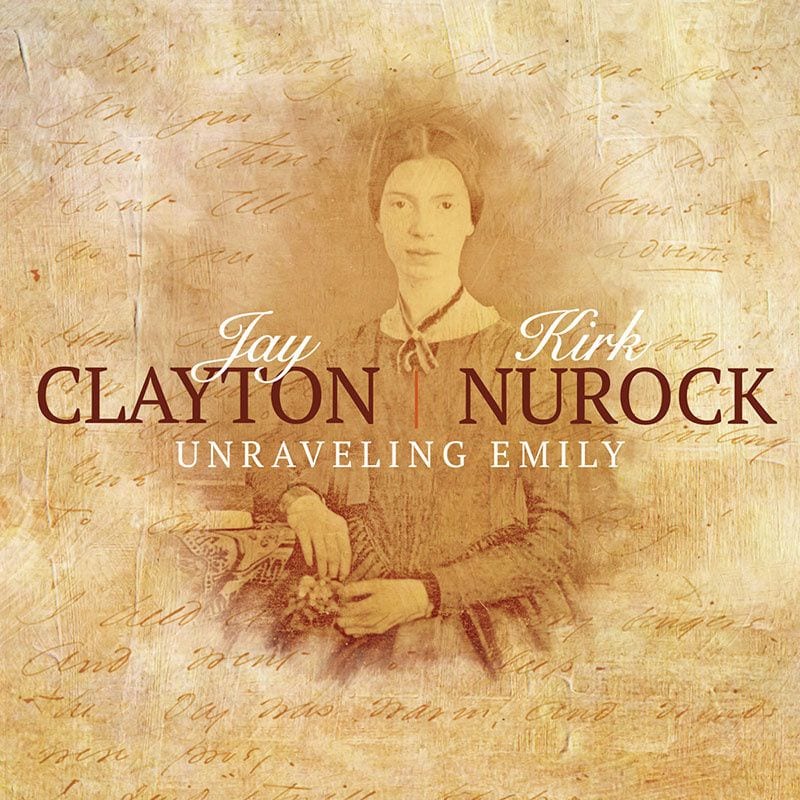
Poetry tends to be a tool for classical music. For hundreds of years, composers have set poems to music as a means to evoke sentiments — or construct new meanings — with the words of authors, a tradition championed from John Dowland to Franz Schubert to Ned Rorem and beyond. The view that a poem’s intent can only is adequately realized only within completely structured music neglects the possibilities inherent with improvisation.
Traditionally underrepresented in jazz, a handful of modern performers have undertaken the task of exploring how to realize these texts in a more fluid, less rigidly structured context.
Unraveling Emily, the most recent collaboration between pianist Kirk Nurock and vocalist Jay Clayton builds upon this relatively recent trend by realizing the poetry of Emily Dickinson through improvisation, studio layering, and surreal compositional soundscapes.
With processed vocals and extended piano techniques opening track “Still We Know (Prologue)” makes no illusions about how far out the record will stretch. The avant-garde approach may be disorienting to some; it values the layering of Clayton’s voice and Nurock’s skittering excursions over a deep reading of Dickinson’s text. Second track “All This and More”, however, is a straight-ahead jazz ballad, a setting that treats Dickinson’s words with reverence without feeling overly sentimental.
Unraveling Emily does this well: balancing the abstract with the straightforward, experimentations with traditional jazz structures. They’re both equally valid methods, and much of the record resides on Nurock’s deciphering of how to appropriately set each text. The detuned barroom piano and spoken delivery of “My Letter” do well in conveying the sorrow of the poem, while the growling swells of “I’m Nobody” articulate a distorted frame of mind. With aleatoric improvisations and post-recording studio processing, works such as “Wild Nights” and “This More and All” convey a modern, artful sense of desperation.
On the opposite end of the spectrum, “I May Remember Him” works beautifully set as a jazz standard. Undeniably adept with extended techniques and sonic experimentation, Clayton and Nurock shine when interacting in a traditional jazz context, trading lines and building an improvisational dialogue. “A Something in a Summer’s Day” hits sorrowful moments while retaining a shining simplicity to its structure. Immense credit is due to both musicians here: Nurock for his taste in crafting a profound realization for each text and Clayton for her nuance in delivering the words in an honest yet elevated manner.
It should be noted that, for the casual jazz listener, the album might seem like a hit-or-miss collection. “I May Remember Him” would perfectly fit within the Great American Songbook, but the theatrical “How Happy I Was”, may challenge some with its recitation and out-of-tune piano waltz. Jay Clayton is an undeniably virtuosic vocalist with a tone and sense of phrasing that blends maturity with energy and enthusiasm. Her laying of childlike gibberish for coloristic effects works when pushing into avant-garde territory, but that’s not to say everyone would appreciate the experimental bent.
The theme of contending with Emily Dickinson’s ghost runs through the record, through her poetry as well as a sense of reconciling with the past. Dickinson was known to improvise at the instrument, something hinted at with the inclusion of a healthy amount of detuned piano playing nostalgic waltzes. Perhaps the instrumental “Emily’s Piano” sums up the album’s zeitgeist: a modern yet respectful examination of the past as source material.

